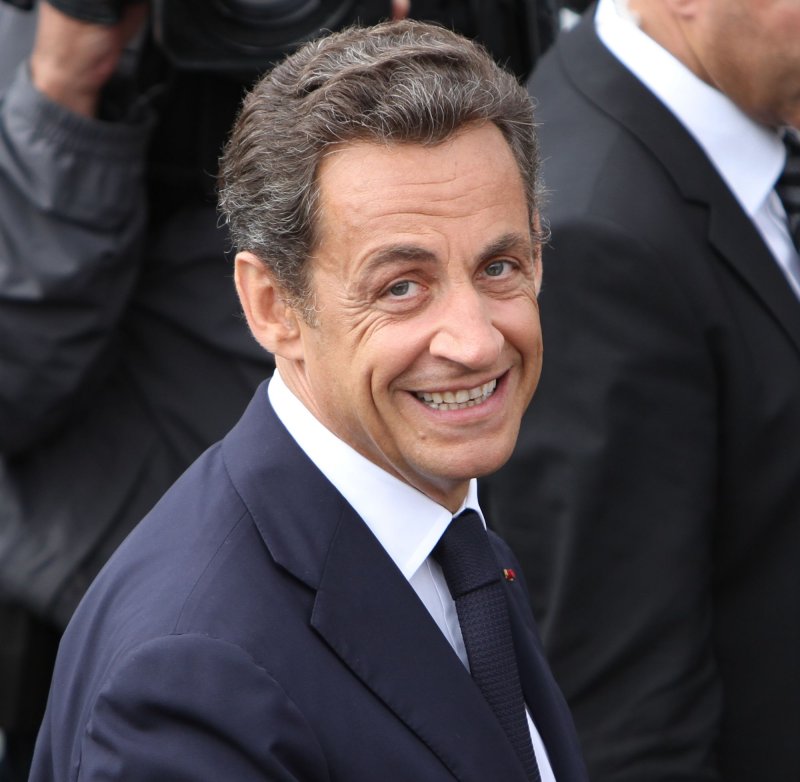French President Nicolas Sarkozy. UPI/David Silpa |
License Photo
PARIS, Aug. 2 (UPI) -- In Europe's toughest package of measures targeting immigrants, French President Nicolas Sarkozy has announced plans to strip French citizenship from those who threaten the lives of police and other public officials.
For the opposition Socialists, the new laws proposed Friday by Sarkozy "challenge the key principle of our republic, equality before the law." Green party leader Noel Mamere told France-Inter radio that Sarkozy "was leading us toward a police state -- this man is dangerous."
Former Europe Minister Pierre Moscovici said Sarkozy's plans "recall the darkest hours of our history," referring to Vichy France's collaboration with the Nazis in sending French Jews to death camps in World War II.
And commentators in the French media questioned whether Sarkozy would have gone so far had his approval ratings not been down to less than 30 percent, amid the ongoing scandal over questionable campaign funds from the Bettencourt family, owners of the L'Oreal cosmetics group.
But the core message of Sarkozy's speech resonated strongly with many French voters, opinion polls indicate, and reflects a reassessment across Europe of the consequences and desirability of mass immigration.
"We are suffering the consequences of 50 years of ill-regulated immigration, which have led to a setback for integration. We are so proud of our system of integrating immigrants, but perhaps we should wake up and see where it has led. It has worked but it works no longer," Sarkozy said.
"It is unbelievable that the grandchildren and great-grandchildren of immigrants feel themselves less French than their ancestors," he added.
Sarkozy was speaking in the Alpine city of Grenoble, which was rocked last month by riots after police killed a young immigrant who was being chased after allegedly robbing a casino. Shots were fired in the riots and local police then received death threats. Last week, dozens of local police and their families were moved to other towns and police reinforcements sent in from elsewhere.
Tensions between police and young immigrants have been simmering since the three weeks of riots that swept France and saw more than 10,000 cars burned in the fall of 2005. A report into the violence described the high-rise public housing estates where immigrants congregate as "the lost lands of France." Some had become no-go zones for the police and were virtually ruled by criminal gangs and drug-dealers.
Declaring "a war against delinquency," Sarkozy's latest speech comes after new laws to ban the wearing of the full face-veil worn by some Muslim women and after the unprecedented conviction of Interior Minister Brice Hortefeux for "racist insult." The minister refused to resign and appealed his $4,100 fine, after he was filmed saying: "When it's just one, that's OK. It's when there are a lot that you get problems."
Before his election as president three years ago, Sarkozy, as interior minister, described young immigrant rioters as "trash" and talked of clearing them away with high-pressure hoses. His tough stance then was credited with helping him win the presidency by gaining votes from the far-right Front National party.
After a brief attempt to govern from the center and appointing a woman of North African background, Rachida Dati, as justice minister, Sarkozy has shifted to the right. He brought in a new law against "outrage against the national flag" and announced tough new action against the Roma immigrants (sometimes called gypsies, many from Eastern Europe), clearing their caravans from "illegal sites" and deporting them.
Other measures already passed make it easier to deport illegal immigrants and to suspend welfare payments from the parents of young delinquents. Another new law imposes fine of $6,500 and up to three years in prison for anyone who "abets" illegal immigrants.
"It's just words, more words and yet more words from Sarkozy," sneered Front National leader Jean-Marie le Pen. "When I started this party 50 years ago my slogan was 'Before it's too late' -- and look how late it is now."
France isn't alone in this backlash against immigration. Italy has bulldozed Roma camps and deported them by the hundreds. Holland is about to get a new center-right government that will depend on the votes of Geert Wilders's anti-immigration Freedom Party. Spain and Belgium have passed laws against the full face veil and the Swiss voted in a referendum against permitting new mosques with minarets.
Britain's new coalition government is imposing annual limits on immigration from outside the European Union. Home Secretary Theresa May has set a temporary cap of 5,400 skilled workers without job offers and 18,700 who have job offers will be allowed in from now until next April, when the new quotas will be announced. Britain will "bring immigration down from the hundreds of thousands that it became under Labor to the tens of thousands that it used to be," May said.
France has the highest proportion of immigrants in Europe, with an estimated 6 million immigrants of Islamic origin in a total population of 61 million. So France appears vulnerable to extremist claims that higher Islamic birth rates could lead to native French becoming a minority in their own country. In fact, immigrant birth rates across Europe are declining fast toward the local norm and native birth rates have been rising sharply in France, Britain, Holland and Scandinavia.
The combination of a recession and unemployment, which affects young immigrants twice as hard as native French, plus concerns about crime and about militant Islam, is heating tensions over immigration across Europe. But in France the mix has been made more explosive by a rattled and unpopular president who is always ready to deploy populist rhetoric when under pressure.
The question now is whether Sarkozy's hard-line new laws can solve the challenge of integration that he has described. If not, there are few steps left to take -- short of mass deportation.















